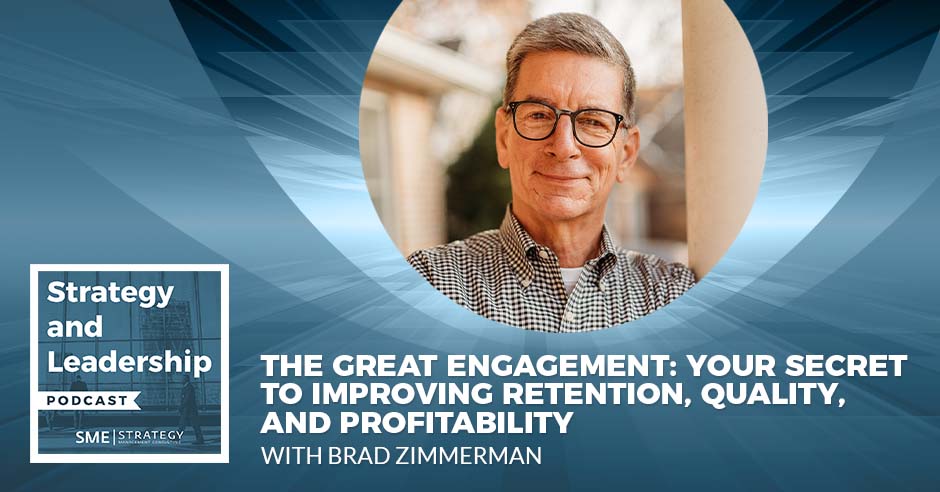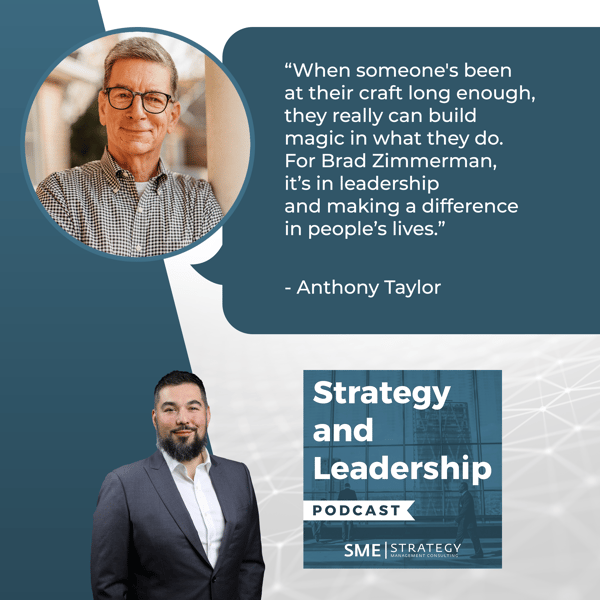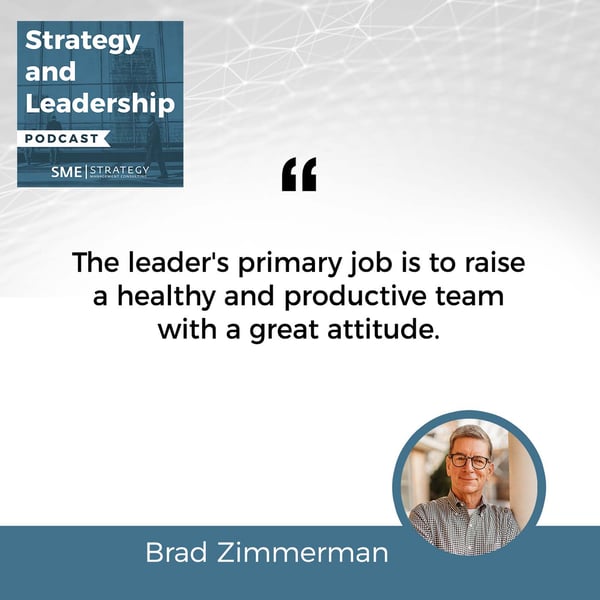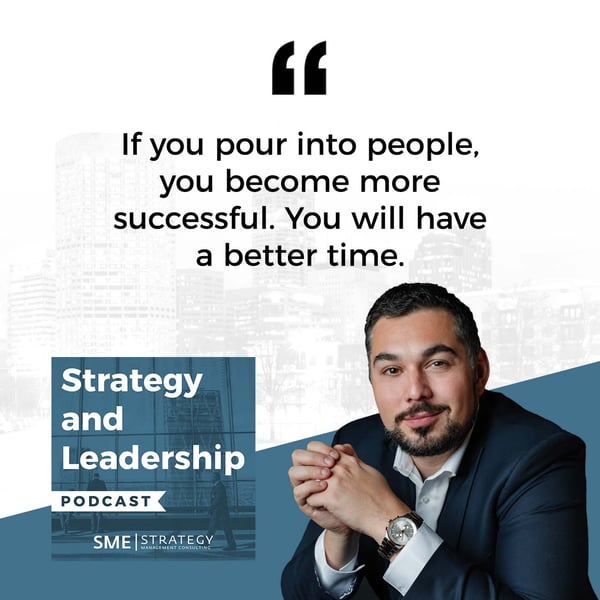The Great Engagement: Secret To Improving Retention, Quality & Profitability

The great resignation woke the eyes of many business leaders to shift their culture in their organizations. That culture shift will keep them afloat in their business because everyone aboard is driven to keep the ship sailing. In this episode, Brad Zimmerman, the Co-Founder and Partner of Phoenix Performance Partner, dives into The Great Engagement to guide leaders into creating high-performing cultures. He explains how leaders are like parents in the business, helping everyone become healthy and productive individuals and allowing them to grow in the organization. As a CEO and leader, we want to spread the commitment to providing value to our customers like a virus. So, don’t miss the wealth of insights Brad Zimmerman brings in this episode. Tune in and set sail into The Great Engagement today.
Want to continue the conversation with other leaders around the world? Join our Strategy and Leadership community.
https://strategy-and-leadership.mn.co/
► Subscribe to our channel for weekly videos on strategy & leadership: https://www.youtube.com/channel/UCOHLNRrpk3rGUdg7qUQjiog/?sub_confirmation=1
➡️ Looking for a sample agenda for your strategic planning offsite? https://www.smestrategy.net/blog/sample-strategic-planning-agenda
Connect with us:
► Contact us: https://www.smestrategy.net/contact
► Connect with Anthony on LinkedIn: https://www.linkedin.com/in/anthonyctaylor604/
About SME STRATEGY CONSULTING:
SME Strategy is a management consulting firm that specializes in helping organizations develop and implement their strategic plans. We work with teams to facilitate conversations about strategic direction and business strategy so that our clients can focus their energy on what will move them forward faster.
► Work with us: Are you looking for someone to facilitate your strategic planning process? https://www.smestrategy.net/strategic-planning-facilitator
► Check out our Strategy & Leadership Podcast: https://open.spotify.com/show/4yND4JKofh64gcvyvcLMqW
► Check out our online course on how to successfully lead your next strategic planning process: https://courses.smestrategy.net/
---
Watch the episode here
Listen to the podcast here
The Great Engagement: Your Secret To Improving Retention, Quality, And Profitability With Brad Zimmerman
I was going to try something new. I'm super stoked for our guest in this episode Brad Zimmerman. Brad, I'm so excited to chat with you. He said it doesn't go by titles, but officially a Partner at Phoenix Performance Partners. He is the author of The Great Engagement. This guy's been doing this for a long time. He knows lots of stuff.
Everybody that we talked to knows lots of stuff but one of the things that I find interesting is when someone's been at their craft long enough, they can build some magic and they have a lot of reference points so far. I like everything about you, Brad. Welcome to the show. I'm grateful to chat with you. How are you?
Thanks for that robust welcome. I'm honored to be with you. You're a very accomplished guy. I checked you out as well. Thanks for having me.
Want to align your team and reach your goals faster? A strategic planning facilitator can help.
It’s my pleasure. It's just being a professional and being in this space supporting people. Human beings are at the heart of it and it's like, “What can you give?” Let's give everything you got for everybody. That's why we're both here. I'm excited for that. Brad, why don't you tell our readers a little bit about who you are, what you do, about your upcoming book, and we'll get into a chat?
Probably the simple explanation is I'm an executive coach, but I don't just do one-on-one executive coaching. I and my team do organizational work. We go in. We help CEOs and top leadership teams create cultures that foster engagement and the personal commitment from the members of the organization that drives the kind of work that you guys do.

It's developing the strategy, and beginning to execute it, but getting people to own it personally is our particular niche. I got into this in 1992 or late '91 when I've got two kids, a dog, and a house in the suburbs. I'm living the American dream. I own a small firm. Everything's great except every morning I was getting up and going, “Is that all there is? What I'm doing isn't making a difference.”
I stumbled into coaching frankly through a self-help program. I got coached and then they asked me if I wanted to get trained in coachin. I got trained and I fell in love. I found that it was a way that I could contribute to people, help them attain their goals, and help them to be better humans. It’s not like I have the answers for all of us. There’s, “How do we be our best selves? How as an organization do we be our best selves?”
I got that about you and that's what I think is cool. Can you tell us a little bit about the work that your firm does with the superintendent?
K-12 education is a fairly new niche for us. We've been working on that for about five years but more generally, we work with organizations that have a social mission. It’s a lot of nonprofit healthcare. The private sector businesses typically have a socially focused mission where they want to make an impact. The education space in general was funding what it is and the whole education arena has been pretty conservative. You don't want people in education who are taking huge risks with your kids but on the other hand, you also want them to take calculated risks to be able to create more innovative approaches toward education.
That's what we do help the administrators of educational organizations, superintendents, and their teams to foster greater levels of innovation, to embrace change, and specifically, I don't know if you're familiar with the idea of social and emotional learning. It’s the idea of helping children to understand how their emotional minds work and learn to regulate, to govern their emotional minds.
The challenge is that most of us adults don't know how to regulate our emotional minds so teaching kids that is great, but to build cultures where social and emotional learning is the fabric of the culture starting with the executive team and translating down into the teaching staff is what we're interested in and committing to do because we think it's going to make a huge difference for the generations to come and improve our societies.
Build a culture where social and emotional learning is its fabric.
Again, I was speaking to folks to check them out, we'll talk about the book and all that stuff at least from our methodology, and our approach, the things that drive the greatest change are the people change distinct from the systemic or process change, which is also important, but none of that moves forward without the individual.
Although I don't think it's any different, I believe that whether you are a superintendent, a CEO, a self-employed person, or an individual working somewhere else, all of the principles of coaching, around mindset, focus, adaptability, communication, cultural connection, all of that applies why I thought personally it was very interesting and exciting is that type of framework and approach typically doesn't show up in education without a push.[Ma1]
However, when I believe it is applied in education, that's where you can create the groundbreaking stuff. We're doing a lot of work in Alaska so it's neat to see the parables around that. Enough about what I think. Brad, you've been doing this a long time. You've seen a lot of stuff. What are some of the things that you think are the biggest drivers or the biggest impacts on people? If our readers wanted to take 2 or 3 approaches out of this for them to learn, think about, and reflect on, what would you say are the most impactful ones that you keep in your right-hand pocket?
Fundamentally, what we do is help leaders in organizations build their ability to be more inspiring and to be more inspirational leaders. Now, that's come to be a very popular term. It's so popular it's almost meaningless. What I mean by that is that the organizations that we serve from a size perspective are anywhere from 150 employees to 1,500 in that range.
People don't think of superintendents as CEOs. Educational organizations with 300 to 500 employees are very common. The much larger is common as well. They're complex organizations. The challenge, the piece I refer to as inspirational is how do you get people to engage, bring their full commitment to work, and bring their full selves. This is what I do. This is the vehicle. My work is the vehicle that I see that I'm going to make an impact on my life.
It excites me. It may exhaust me. It's not to say it's Nirvana, but I do it because it's important work, and t it's shown that the thing that younger generations now are looking for more than anything else is that kind of meaningful work. Organizational leaders who develop their own ability to be able to inspire people to take on the commitment of the organization and take it on as their own are the most successful.
Most organizational leaders that we find got to where they got to because they're good at getting stuff done. I was the same way. The higher they go in the ranks, the more they become super-doers. We end up working long hours, cranking out lots of work, and solving lots of problems. However, at some point, you have to make the mental shift from superdoer to developer of people. That's a completely different job. You got to lead, manage, and coach. When you have time left over, then you get stuff done. It's like being a parent because a lot of people say, “I got to get all this stuff done,” but yeah, you do. It's just not the primary job. It's like being a parent.
You got to do the laundry. You got to change the sheets. You got to take out the trash. You got to cook the meals. You got to keep the house. You have to take the kids to school. You got all this stuff you got to do but every parent knows that's not the primary job. The primary job is raising healthy and productive kids who have a great attitude. How do you focus primarily on that primary job of raising healthy and productive kids and secondarily, getting the stuff done?

You get the stuff done in a way that helps your kids grow up, teaches your kids responsibility, etc. It’s the same thing in organizations. I don't mean to make organizations sound like a parent-child relationship at all. As an organizational leader, if I view my job as making sure that I'm getting my inbox cleaned out and making sure that I'm getting the job description, and all the stuff done, it's a very different job than if I view my job is making sure that my people are growing. Also, they're accomplishing their goals, they're expanding their capacity, and they've got a strong link to the work that we do. When they do, then they want to do all those things. They want to develop.
I think it's the balance between there's the inspiration and then there’s hyping people up and everybody wants to have stuff that's inspiring but it inflates temporarily. Also, the point around what you're talking about equipping people so that they're supported long-term. The balance is like, “However many people you have, there's the operational and then there's the people side of things.”
In your new book, The Great Engagement, how do you view the balance between a leader's inspiration and equipping and then making it all the way down to an employee who isn't in this case resigned? The difference between, “Why aren't you engaged up here? Is it this person's job up here to engage you? Is it your own job to engage you?” How do you balance that with the word inspiration? Whose problem is it? I don't exactly know how to ask the question. Do you know what I'm talking about?
It's a complicated subject. It's hard to even know how to answer the question, let alone how to answer it frankly. It becomes a cultural attribute. When we work with clients, we always start with the CEO and the top leadership team because the CEO and the top leadership team are the font or the wellhead of this. If you can get them engaged, and inspired, and have them see that their job is to spread the commitment to providing value to our customers like a virus so that people aren't looking at their job.
There was an old Dunkin Donuts commercial years ago where they showed this guy in the back room and he is back there working away at 3:00 or 4:00 AM. He is going, “Time to make the donuts.” I always think of that as “I'm like a cog in a wheel doing what I'm told to do as opposed to I'm here to make donuts because our organization is all about making sure that people get a great start to their day. That people make sure that they get a tasty breakfast that gets them started so that they're going out ready and equipped to provide value to others and being a bright spot in their day.”
It's a very different purpose than making donuts. Back to your question, it starts with the CEO's willingness to generate that kind of purpose. I'll give you an example. We work with a company that's in the automated vehicles business. It’s very innovative and high-tech. They're at the forefront of that business but what they're interested in is transforming urban spaces, making more space for nature, walking areas, for bike paths by making transportation more efficient through the use of small-scale mass transit.
They're working with technology but they're interested in creating these great social spaces out of our older cities. They get very excited about them. It's what fuels them. The CEO and the management team talk about this. It's the context for everything they do. The engineers out on the floor who are developing this crazy new technology that I can't even get my brain wrapped around, frankly when they start talking. They get excited about it. It is the fuel that drives the organization. That's very different than somebody that's talking about technology for technology's sake.
I took away a couple of things. I wrote down what fuels them and riffed on that because it's part of the job of the CEO to figure out what fuels their employees and support that. Let's say they didn't have that existingly. The other process piece of that is hiring people that want to do that but then to do that, you need to know what it is so you need to be clear on what your purpose is. Your executive team needs to be clear on what your purpose is so that you can effectively hire and train people to do that.
However, one of the things that I took away taking back from what you said is as a CEO, as a senior leader, you probably want to do well and if you feel like you're failing, you're probably not having a fun time. Also, the contextual switch to, “You're not only doing a bunch of stuff, you're pouring into that.” If you pour into people, you're going to be more successful. You're going to have a better time because if you only stick in the operational stuff, you'll fail over here. You can do one but not the other and I think it's all about helping people win in a manner of speaking. Do I have most of that Brad?

You absolutely have it. I'll give you another example. I worked with an organization in the financial services business a number of years ago. They provided financial services for small businesses that helped them become more effective and grow to the next level of financial stability and independence. When we started working with them, all they talked about was money numbers. They complained about how hard it was to get good people, get people engaged, and get people who are interested in working and all this stuff that you hear people complain about.
We worked with the leadership team and after working for a while asking lots of questions and putting them through a lot of exercises, and lots of inquiry, they realized that their business was about helping these small businesses that they focused on to become more effective, independent, and financially sustainable. Also, when they were able to do that, they'd worked themselves out of a job. They'd taken these organizations to a point where they didn't need their services anymore and that became how they defined success.
Rather than focus on, “You got to go out and bring in more clients. You got to bring in more sales. You got to bring in these numbers,” they started focusing on that purpose. People got excited and those people who were like, “I don't want to go out and make sales calls. It's hard. I face a lot of noise. It's frustrating.” All of a sudden, they started thinking, “Yeah, I get to help these people.” It's a completely different conversation I'm having with them because it's not about my need to get sales. It's about, “How can I help you, Mr. Small Businessman be more successful?”
Their success rate increased. The number of referrals that they got from their customers increased and they began to grow. This is an organization and a bunch of bankers who at the beginning treated us like we were crazy when we were saying to them, “Your mission is not about money.” We have these huge arguments about it and they finally saw it.
The why behind what you do, the tribes did it. It's one of those things that no one can duplicate because it is your own unique sauce. Whether you're a small business or a big established business, it’s the roots. If you follow the wellhead example, they're so deep that there's one branch that is you, and if you own that and can own that top down, bottom up, I believe you can become a really powerful organization.
I will take the opportunity because one of the things you shared about was mission and purpose. I'm going to take the opportunity for everybody. I have to make sure I get the link right. If you go to PhoenixPerform.com/sme, you can get a copy of the book. I'm not here to plug. I never plug, but I have to say that my belief is that you created this page Brad so that it'll make it a lot easier for folks to get the book and to get into the hands of their people and to make a difference.
Given that's the context, I'm like, “Yes, let's do that.” I don't care to help you sell an extra couple of books, but I do care if you help more people. I love this page. You can read this again. You can share it with your friends. You can get a copy of the book. I do not make any money off of this nor do I want to, but I appreciate that was the context. You’re like, “I want to make sure people get this,” and so do I because it makes a big fricking difference not only in your work, but the human being behind it.
It changes the trajectory of their life. If they like their job, if they like what they're doing and they feel like they're making a difference. I imagine that's probably why you've been doing this for so long because after you're running a successful business, you say, “What's left for me?” Now, you're kicking butt making a big difference. That's awesome.
Thank you. You said you're not making any money off of this. If you saw the margins on book sales, you'd realize we're not making any money off it either. We're doing it for the same reason we want to reach more people with this work and this message because we've seen the difference that it makes. It’s that simple. At my age, people keep saying, “When are you going to retire?” I keep saying, “When I can't do this anymore,” because why would I stop doing something that I enjoy doing so much?
One of the quotes that I live my life by is, “The master in the art of living,” by James Michener. If anybody wants to Google it, that's my personal motto. It's very cool but basically, no one knows the difference between work and play.
You’re not going to believe this Anthony, but I have that very quote right up there on the shelf.
Brad, where can people get ahold of you? Where can they connect with you, chop in whether they're in Michigan or anywhere else?
Either PhoenixPerform.com. It’s the root of that page that you showed or they can get me directly at Brad@PhoenixPerform.com. I'd love to talk to anybody interested in talking.
That's why I said, “We should probably start the show because we'll talk for a long time, Brad.” I do look forward to the next time that we can chat. It’s truly a pleasure. Thank you for joining me on the show. It was a blast. Best of luck with the book and with everything that you're doing. Keep making a difference for people.
Thank you, Anthony. I appreciate it and keep doing what you're doing as well. It's making a big difference.
Thank you. It is my pleasure. Folks, my guest, Brad Zimmerman, who's a partner at Phoenix Perform Partners and Phoenix perform.com/sme if you want to get a copy of the book. Share it with a person in your organization because that's the thing that I'm leaving this show with is there's the idea of inspiration. To Brad's point originally, inspiration comes sometimes across as hype and full of fluff but when you're connected to your mission, your organization, your team, and your people get it, they are inspired and you can feel the life being breathed into things. That is what makes a big difference to an organization.
When you're connected to your mission and organization, and your team and your people get it, they are inspired, and you can feel the life breathed into things.
If you can build that, it becomes something worthwhile and you make a bunch of money in the process. Folks, thanks for joining me on this episode. Share this with somebody you like or you don't like. Get it into the hands of folks because that's what we're here to do. Thanks for being here. Thanks for watching. Thanks for subscribing. I'll see you next time.
Important Links
About Brad Zimmerman
 BRAD ZIMMERMAN has been helping CEOs Create Exceptional Cultures... since 1992. He believes there is unlimited potential in the human spirit and that we all adopt beliefs that
BRAD ZIMMERMAN has been helping CEOs Create Exceptional Cultures... since 1992. He believes there is unlimited potential in the human spirit and that we all adopt beliefs that


